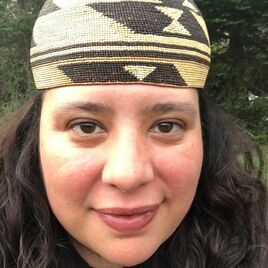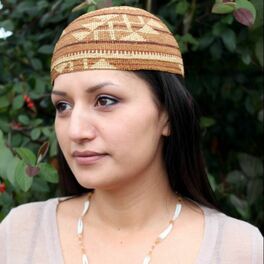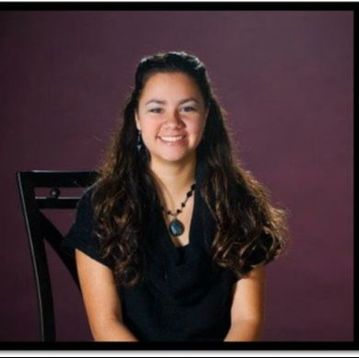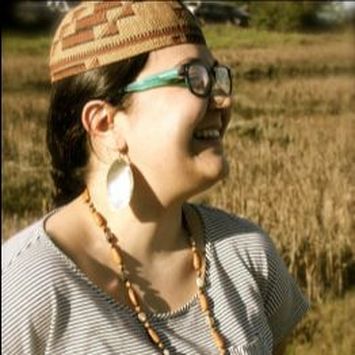Stephanie Lumsden (Hoopa Valley Tribe)
Stephanie Lumsden is an enrolled member of the Hoopa Valley Tribe in Northern California. She received her Bachelor’s degree in Women’s Studies from Portland State University in 2011 and her Master’s degree in Native American Studies from the University of California, Davis in 2014. She is currently a first year PhD student in the Gender Studies department at UCLA. Her dissertation project seeks to flesh out the relationship between the prison industrial complex and settler colonialism. For this project she is interested in discussing the ways in which settler relationships to land facilitate an economy that depends on the incarceration of millions of people. She is focused on articulating the value of land while centering Native epistemologies of belonging and responsibility. She also seeks to explore how the dispossession of Native women in particular makes incarceration possible and what this means for abolition politics.
Kateri Masten (Hupa, Yurok)
Kateri Masten was raised in a close-knit family of fisherman, hunters, and basket weavers within Hupa and Yurok culture in Northern California. She
began weaving her first stitches at the age of 6 under the guidance of her great Aunt Josephine Peters, a renowned Native Herbalist and Master Weaver. Now, more than 25 years into her weaving career, she has earned the recognition from her community as a Master Weaver. She is dedicated to ensuring that this beautiful tradition and sustainable practice continues strongly into the future. She shares the knowledge that was passed to her from a previous generation to the next generation, including her three children. Basket weaving is a practice that takes a large amount of knowledge of protocol and practice to maintain the balance in the environment and balance within the baskets. Aside from Kateri’s basketwork, she also commits a sizeable amount of her time to community engagement. She is on the board of the Native Women's Collective, a grassroots nonprofit organization that supports the continued growth of Native American arts and culture through public education, workshops, exhibits, research, cultural preservation projects, programs and technical assistance. She also serves on the Historic Clarke Museum’s Nealis Hall Committee. In this position she is able to share her
cultural knowledge with museum staff to ensure the proper handling of baskets and sacred objects. Ms. Masten’s professional career is also dedicated to supporting Native communities. She serves as the Executive Coordinator for The Seventh Generation Fund for Indigenous Peoples, a non-profit dedicated to promoting Indigenous Peoples' self-determination and the sovereignty of Native nations. This position has created multiple opportunities to exchange knowledge with Indigenous artists and cultural practitioners from across the globe.
began weaving her first stitches at the age of 6 under the guidance of her great Aunt Josephine Peters, a renowned Native Herbalist and Master Weaver. Now, more than 25 years into her weaving career, she has earned the recognition from her community as a Master Weaver. She is dedicated to ensuring that this beautiful tradition and sustainable practice continues strongly into the future. She shares the knowledge that was passed to her from a previous generation to the next generation, including her three children. Basket weaving is a practice that takes a large amount of knowledge of protocol and practice to maintain the balance in the environment and balance within the baskets. Aside from Kateri’s basketwork, she also commits a sizeable amount of her time to community engagement. She is on the board of the Native Women's Collective, a grassroots nonprofit organization that supports the continued growth of Native American arts and culture through public education, workshops, exhibits, research, cultural preservation projects, programs and technical assistance. She also serves on the Historic Clarke Museum’s Nealis Hall Committee. In this position she is able to share her
cultural knowledge with museum staff to ensure the proper handling of baskets and sacred objects. Ms. Masten’s professional career is also dedicated to supporting Native communities. She serves as the Executive Coordinator for The Seventh Generation Fund for Indigenous Peoples, a non-profit dedicated to promoting Indigenous Peoples' self-determination and the sovereignty of Native nations. This position has created multiple opportunities to exchange knowledge with Indigenous artists and cultural practitioners from across the globe.
Callista Ruiz (Yurok Tribe)
Aiy-yu-kwee! Hello. My name is Callista Lanika Ruiz. I am currently twenty- three years old and belong to the Yurok Tribe. I am a descendant of the Karuk, Osage, and Tohono O’odham Tribes. I am currently working towards my Master degree in Social Work so I may better serve my community. As a young American Indian woman, raised on the Round Valley and Hoopa Indian Reservations, my upbringing and cultural involvement has greatly influenced the person I am today. Cultural arts have always been a big part of my life. From a young age, I began to draw, paint, crochet, bead, and basket weave. My passion for being active in my culture, has continued to grow over the years. I am excited to continue to learn and improve my skills.
Rachel Sundberg (Ner-er-ner (coastal Yurok) enrolled Trinidad Rancheria)
Rachel Sundberg is Ner-er-ner (coastal Yurok) and an enrolled member of the Trinidad Rancheria. She has her BA in Native American Studies from Humboldt State University. Ms. Sundberg is the Tribal Programs Director for the Trinidad Rancheria where she manages and implements grants and cultural programming; cares for the basket and regalia collection and is responsible for the oversight and administration of multiple program areas for the Tribe. She serves as a member of the Nealis Hall Committee for the Clarke Museum and will be joining the board of the Clarke Museum in 2018. She sees the Native Women’s Collective as a support for Native artists and a space to bring their dreams to fruition. She also sees it as a place for the communication of ideas across generations and cultures. Rachel is passionate about providing space for all Native people to have access to cultural lifeways, regardless of political identity or enrollment status.
"I have a mandate from my grandmother that I will never be exclusionary, but rather include any and all that wish to learn about culture and ceremony. I can't say that I know much, but what I do know, I have a duty to share with others."




